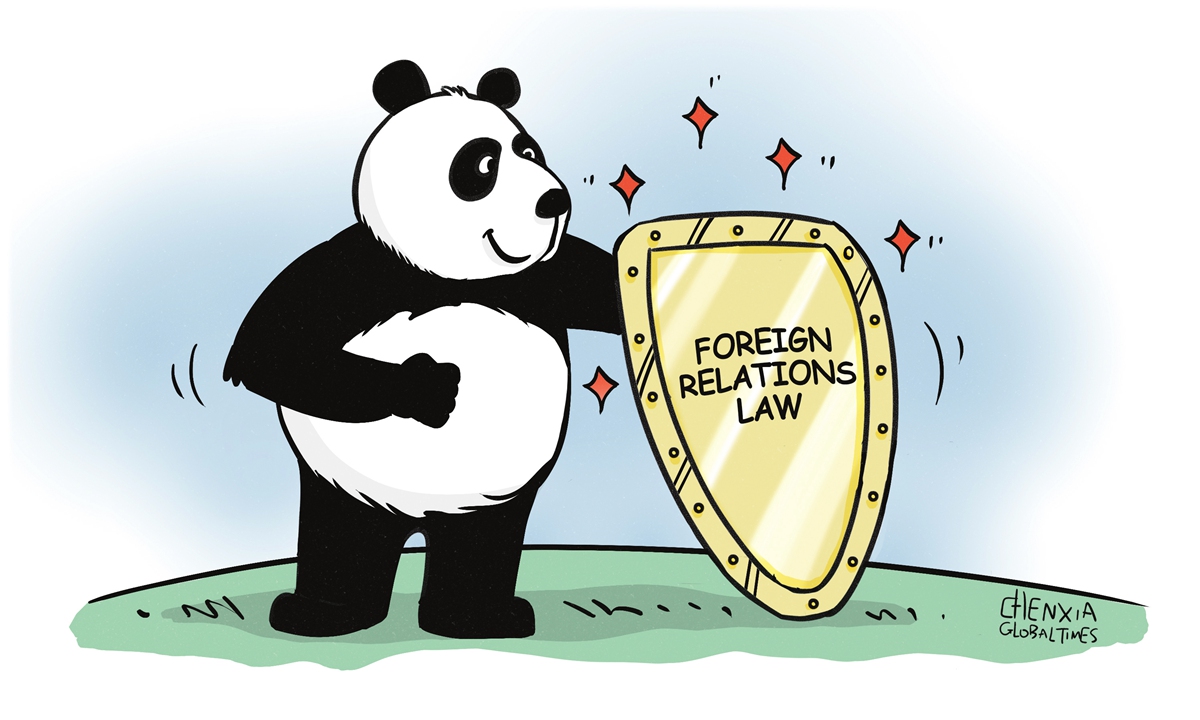
Illustration: Chen Xia/GT
On Wednesday, the Law on Foreign Relations of the People's Republic of China (hereinafter referred to as the Foreign Relations Law) was adopted at the Third Meeting of the Standing Committee of the 14th National People's Congress. President Xi Jinping signed the Order No.7 of the President of the People's Republic of China to promulgate it. The formulation and promulgation of the Foreign Relations Law is a significant measure for China to promote the rule of law domestically and in foreign affairs comprehensively and to strengthen legislation in the field of foreign affairs. It has profound historical significance and significant international influence.
First, the formulation and promulgation of the Law is an inevitable requirement for China to respond to changes in the world, the times, and history and to use the rule of law to maintain international order and promote global development.
Currently, the world is entering a period of turbulent change. On the one hand, the historical trend of peace, development, cooperation, and win-win situations is unstoppable. The aspirations of the people and the overall situation determine that the future of humanity will ultimately be bright. On the other hand, acts of hegemony and bullying, such as relying on strength to bully the weak, seizing advantages brutally, and playing zero-sum games, have caused severe harm. The deficits in peace, development, security, and governance have worsened, and human society is facing unprecedented challenges.
In this context, China formulated and promulgated the Foreign Relations Law to systematically and comprehensively construct the legal principles, systems, and rules for developing foreign relations. It clearly expresses the firm determination to uphold the international system with the United Nations (UN) at its core and the global order based on international law.
Second, the formulation and promulgation of the Foreign Relations Law is an inevitable requirement for China to adhere to the comprehensive rule of law, coordinate the promotion of the rule of law at home and in foreign affairs, and provide a strong guarantee for the rule of law to promote the great rejuvenation of the Chinese nation with the Chinese path to modernization.
Due to the changes in the external environment faced by China in recent years, new contradictions and challenges have emerged, and the institutional shortcomings in the rule of law in foreign affairs have gradually become apparent.
On the one hand, in the face of frequent interference in China's internal affairs, unilateral sanctions, and "long-arm jurisdiction" by certain Western hegemonic countries using "legal" means, China has not yet established a comprehensive defense system and effective blocking mechanism, and the "shield" of the rule of law in foreign affairs has not been fully forged. On the other hand, regarding using the rule of law to safeguard national sovereignty, security, and development interests, China's laws still have insufficient institutional supply, and the "spear" of the rule of law in foreign affairs urgently needs to be accelerated.
In light of this, it can be seen that the formulation and promulgation of the Foreign Relations Law in China, which systematically defines the principles, power allocation, objectives, tasks, systems, and guarantees for the development of foreign relations, is a significant legislative measure to accelerate the construction of the rule of law in foreign affairs and fill the gaps in the rule of law in foreign affairs. The promulgation and implementation of the Law marks a significant improvement in China's ability to carry out international struggles and defend national and people's interests through the rule of law, thereby providing strong legal guarantees for the comprehensive promotion of the great rejuvenation of the Chinese nation with Chinese characteristics.
The Foreign Relations Law upholds the banner of safeguarding international law and global order, fully leveraging the advantages of China's national system and governance system. It summarizes, inherits, and develops China's national practices and experiences in participating in the international rule of law and global governance. It is a piece of legislation in foreign affairs that accurately reflects the development trend of the international rule of law and possesses distinctive Chinese characteristics.
First, the Foreign Relations Law features a thorough layout, a coherent framework, and a wealth of substance. It comprehensively stipulates the guiding ideology, purpose, principles, goals, and tasks of China's development of foreign relations. It scientifically regulates the allocation of various powers in China's development of foreign relations and systematically formulates the institutions and rules for China's development of foreign relations. It can be regarded as the "basic law" and a milestone in China's rule of law system in foreign affairs.
Second, the Foreign Relations Law inherits China's long-standing diplomatic stance and the principle of international rule of law in the form of legislation. It legally affirms, interprets, and promotes a series of new concepts, propositions, and initiatives with Chinese characteristics, reflecting the spirit of the times and leading the trend of human progress in diplomacy and the international rule of law since the new era. It is a piece of legislation that adheres to tradition while promoting innovation in foreign affairs. It also exemplifies Chinese wisdom in establishing domestic legislation that fosters the global rule of law, peace, stability, and growth.
Third, the Law establishes explicitly a chapter that thoroughly and methodically stipulates the institutions and rules of China's foreign relations. It, in particular, addresses major legal issues related to the implementation and application of international treaties, the execution of UN Security Council resolutions, the adoption of countermeasures under the law, the protection of overseas interests, foreign aid, as well as foreign law enforcement and judicial cooperation. This legislation marks a new legal and institutional development stage in China's foreign relations.
In summary, with the promulgation and implementation of the Foreign Relations Law, as well as the introduction of more legislation in the field of foreign affairs in the future, China's ability to defend national and people's interests through the rule of law will continue to improve.
The author is a professor from China University of Political Science and Law. opinion@globaltimes.com.cn




